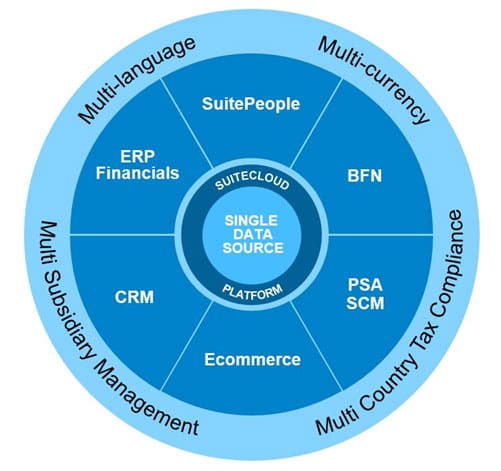What is NetSuite ERP?

Credit: (What is NetSuite and How Does It Work? | NetSuite)
NetSuite ERP is an all-in-one cloud business management solution that helps organizations operate more effectively by automating core processes and providing real-time visibility into operational and financial performance. With a single, integrated suite of applications for managing accounting, order processing, inventory management, production, supply chain and warehouse operations, NetSuite ERP gives companies clear visibility into their data and tighter control over their businesses.
Video: What Is NetSuite & How Does It Work?
5 Core Features of NetSuite
Products Overview
NetSuite can adapt to meet the needs of diverse businesses because it has a wide array of modules dedicated to critical business functions and processes.
Finance
Financial Management: NetSuite’s financial management solution handles many bookkeeping tasks by automatically updating the general ledger, tracking accounts receivable and accounts payable and submitting invoices. This module speeds up the monthly close and simplifies the creation of key financial reports for regulatory and statutory reporting. It supports complex revenue recognition standards and easily consolidates financial statements from subsidiaries — including business units in other countries — with real-time currency conversion.
Global Business Management: NetSuite OneWorld allows multinational and multi-subsidiary companies to manage their entire enterprises in one system. It can handle the diverse needs of global businesses via support for diverse currencies, languages, tax laws and reporting requirements. OneWorld offers financial roll-ups at the regional, country and global level, so decision-makers can get as broad or as focused a view of the business as they desire.
Planning and Budgeting: NetSuite Planning and Budgeting gives business leaders everything they need to create detailed departmental or companywide budgets and forecasts. The module also provides financial analysts with access to statistical models that allow them to run what-if scenarios that project revenue, expenses and more based on different possible outcomes.
Billing: NetSuite SuiteBilling helps companies manage invoicing and billing. It supports transaction, subscription, usage-based and other billing models, reducing the complexity of managing financials for many modern businesses. SuiteBilling records revenue in compliance with current revenue recognition standards. This module helps businesses stay flexible and profitable.
Operations
Inventory Management: NetSuite Inventory Management provides a single view of inventory across all channels and locations, automatically updating levels in real time. The inventory management module can use sales data to set reorder points and alert purchasing managers when it’s time to place replenishment orders. It also manages cycle counts. All of this functionality helps businesses keep the ideal amount of stock on hand and avoid both out-of-stocks and excess inventory, boosting cash flow and profitability.
Order Management: NetSuite Order Management handles the complete order lifecycle, from receipt through delivery, at each stage — as they’re placed, released, shipped and settled with the customer. This module can automate order processing and manage fulfillment across channels based on predefined rules. All of this leads to faster, more accurate fulfillment that reduces shipping costs while increasing on-time delivery rates and customer satisfaction.
Procurement: NetSuite Procurement can improve the complete procure-to-pay process to save businesses time and money. Customers can keep a list of approved vendors, collect quotes and automate purchase orders while granularly monitoring performance and spend and enabling vendor self-service and expediting payments.
Warehouse Management System (WMS): NetSuite WMS builds on the system’s inventory management capabilities, adding functionality for putaway, order picking, barcode scanning and returns authorization. The WMS module can run on mobile devices to direct warehouse employees through receiving, picking and cycle counting. The application, which also reports on warehouse activity, boosts warehouse efficiency and helps companies fulfill and ship orders faster.
Manufacturing: NetSuite Manufacturing is built for companies that make or assemble products. The module helps with production planning and scheduling, shop-floor management and monitoring production to reveal insights and improvement opportunities. It ensures you have all the right supplies and parts in the right place at the right time and allows managers to build, release and track work orders. That visibility into the entire production process can ensure quality, reduce costs and increase on-time delivery.
Demand Planning: NetSuite Demand Planning can help plan future demand for the products and services you offer based on historical data, existing opportunities or imported sales forecasts. The module can plan using the moving average, linear regression or seasonal average methods. Demand planning also helps with supply planning, automatically creating purchase and work orders based on the demand plan.
Customers
Customer Relationship Management: NetSuite CRM presents a 360-degree view of customers. Sales force automation features help manage leads, quotes and sales to speed up the lead-to-cash process. Forecasting tools review sales data to more accurately predict future sales. The CRM application also improves customer service by combining all important data, like sales history and active support cases, in one place. Marketing automation tools in the CRM help companies manage campaigns and segment customers so they can be targeted with more relevant messaging.
Commerce: NetSuite SuiteCommerce allows retailers, distributors and manufacturers to create outstanding omnichannel shopping experiences. The application allows companies to launch and manage mobile-friendly ecommerce sites with user-friendly tools. Multi-channel, multi-location businesses can connect all transactions and visits by unifying SuiteCommerce with the SuiteCommerce InStore point-of-sale application. The result is better customer experiences on the front end and a seamless order flow on the back end, with all payment and customer information automatically flowing into the ERP.
Additional Capabilities
SuiteApps: SuiteApps are a vast catalog of applications developed by Oracle NetSuite and partners that extend the capabilities of your NetSuite instance, whether through additional functionality or integrations with other SaaS solutions. There are SuiteApps for all types of industries and business needs, and most of them run within NetSuite.
Payroll: NetSuite Payroll automates calculations of earnings, deductions, taxes, bonuses and paid time off, accounting for variations in taxes across the United States. With the module, businesses can pay employees via direct deposit or print checks, file payroll taxes and create tax forms (like W-2s and 1099s) for employees. The payroll solution reduces the time spent processing payroll and ensures compliance with oft-changing employment laws and regulations.
Human Resources: As NetSuite’s HR system, SuitePeople weaves human resources data throughout the suite. This solution stores personnel information, guides new hires through onboarding and tracks promotions and compensation changes. It gives employees self-service tools to request time off, view directories and org charts and publicly congratulate colleagues, while allowing managers to conduct and track performance reviews. SuitePeople lets employees handle more tasks on their own and helps organizations retain top performers.
Professional Services Automation: NetSuite PSA solutions are designed for services companies or services divisions within product companies. This system provides project and resource management, billing, time and expense management and project accounting capabilities. OpenAir can track time and expenses in detail, then automate customer billing based on project milestones or a set schedule. The module delivers better resource utilization, a higher rate of on-time projects and increased profitability.
Analytics: SuiteAnalytics harnesses all the data in the NetSuite platform to provide deeper insights, from summary to transaction levels. The SuiteAnalytics workbook enables users to build on saved searches and reports with custom filters and visualizations. Employees can get answers to pressing questions with simple drag-and-drop tools — there’s no need for coding or complex queries.
How Does NetSuite Work?
All NetSuite solutions are delivered through the cloud in a subscription model. NetSuite was a cloud pioneer and remains fully committed to that deployment model — it does not offer any on-premises options.
It’s a multi-tenant cloud solution, meaning all customers run on the same version of the software and its back-end infrastructure and regularly receive updated versions, automatically. Each customers’ data is stored and secured separately. This creates economies of scale because everything runs on the same code.
Users access the platform securely through a browser from any device, whether a laptop, smartphone or tablet. This flexibility empowers decision-makers to track the performance of their business and be alerted to any problems regardless of where they are, so long as they have an internet connection. Role-based access gives authorized employees the information they need to excel in their roles without viewing data not relevant to their jobs.
NetSuite users access all ERP modules, and the functionality within them, through a single sign-on portal — all the key information and tools needed to run your business are in one place. Customers can use simple drag-and-drop tools to personalize their home dashboard with the metrics, charts, graphs, reminders and shortcuts that are most critical to their roles.
The same is true for all real-time dashboards throughout the suite.
How NetSuite Can Be Customized to Meet Your Exact Requirements
NetSuite’s SuiteCloud platform allows customers to extend the system’s capabilities and tailor it to their exact business needs. This gives customers the flexibility to meet the shifting business challenges of today and tomorrow. There’s no threat of version lock, as all customizations automatically carry over with platform upgrades.
Here’s a quick breakdown of SuiteCloud applications and developer tools:
Customizations: This tool makes it easier for developers to create custom fields, forms, records and roles. With SuiteBuilder, companies can tweak the system to reflect their organizational structure and terminology.
Process Automation: Developers can build custom workflows for different business processes with SuiteFlow. They can use an intuitive user interface to automate processes like lead nurturing and approvals for purchase orders and sales discounts.
Platform Development: Developers and NetSuite administrators can build almost any new application or process they can dream up with this tool. They do this through JavaScript application scripting, and SuiteScript can debug their code.
Integration: SuiteTalk enables developers to build custom integrations so data flows smoothly from NetSuite to outside software applications. It does this through a few different integration tools.
Application Distribution: This tool helps both customers bundle customizations and applications they develop for faster, easier deployment. SuiteBundler makes it easier for partners to send out new versions of these applications and for customers to apply customizations to different accounts.
Internationalization: Create an environment for end-users and administrators that feels completely natural no matter which local language, currency, or tax and accounting rules apply to your global company or offshore subsidiary.
Performance Monitoring: Performance health dashboards provide visibility into systems health to maintain optimal performance and stability of your NetSuite account to ensure business continuity and keep users productive, and include integrated tools to rapidly identify root cause issues affecting product experience.
What Type of Businesses Use NetSuite?
NetSuite has become the industry leader in cloud ERP because it can address the needs of businesses of all shapes and sizes. That includes early-stage startups up to household-name enterprises, products- and services-based organizations and companies that sell to other businesses, consumers or both.
The more than 31,000 customers that use NetSuite operate in a variety of industries, including:
- Advertising and Digital Marketing
- Apparel, Footwear and Accessories
- Campus Stores
- Consulting
- Education
- Energy
- Financial Services
- Food and Beverage
- Health and Beauty
- IT Services
- Manufacturing
- Media and Publishing
- Nonprofit
- Professional Services
- Restaurants and Hospitality
- Retail
- Software and Technology
- Transportation and Logistics
- Wholesale Distribution
NetSuite supports employees across various departments and roles within these companies, from the C-suite down to sales reps and HR professionals. In addition, the software supports more than 190 currencies, 27 languages and automated tax compliance in 100-plus countries.
NetSuite ERP Benefits
- Automate Financial Processes. Improve financial operations, efficiency and productivity.
- Gain Inventory Visibility. Monitor inventory levels, minimize carrying costs and deliver orders on time.
- Supply Chain Optimization. Control the flow of goods across the value chain, from suppliers to customer.
- Flawless Order Management. Error-proof your order management and procurement.
- Increase Warehouse Efficiency. Optimize the putaway process and reduce picking errors.
Challenges NetSuite ERP Solves
- Manual Processes. Automate and streamline manual processes that waste time and resources
- Data Accessibility. Quickly and easily access real-time data across the organization
- Data Integrity. Provide stakeholders with timely, accurate financial statements, inventory reports and more
- Meeting Expectations. Deliver promised order accuracy, on-time delivery and cost savings
- Balancing Supply and Demand. Manage supply chains in the face of rapid change, rising costs and shifting buyer behavior
- Inventory Insights. Plan and balance inventory to meet demand
Achieve Better Business Results with NetSuite & Circular Edge
Grow and scale your business while gaining a competitive advantage with NetSuite’s best-in-class integrated cloud business software and Circular Edge’s expertise in NetSuite implementation, advisory, managed services and direct staffing. Let us show you how to leverage our direct staff pool of resources to realize better insights, organizational efficiency, increased profitability and improved relationships with your suppliers and customers – and ultimately take your business to the next level.
Contact Circular Edge today to learn more about our NetSuite consulting services.


